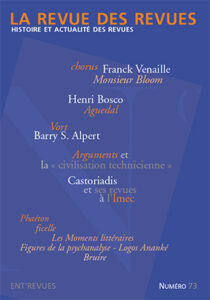par Patrick Marcolini
2025, in La Revue des revues no 73
La revue Arguments (1956-1962), animée principalement par Kostas Axelos, François Fejtö, Jean Duvignaud et Edgar Morin, a surtout été analysée comme un jalon important de l’anticommunisme de gauche, et comme un laboratoire des idées de Mai 68. Ce prisme interprétatif a occulté tout un pan de réflexion qui a pourtant été déterminant dans la revue : la critique de la « civilisation technicienne », pour laquelle furent mobilisés des outils empruntant au marxisme et à Heidegger. Mais étudier la place de ce qu’on appelle aujourd’hui la « technocritique » dans les pages d’Arguments éclaire le rôle méconnu du sociologue Georges Friedmann, spécialiste du machinisme, dans le développement de cette réflexion. L’article revient enfin sur les tentatives de plusieurs membres d’Arguments pour traduire leur travail théorique sur le plan de l’action politique, et montre comment la revue a posé les premiers linéaments d’une écologie qui refuserait le règne de la technique.
The journal Arguments and the critique of the ‘technicist civilisation’
The journal Arguments (1956-1962), mainly edited by Kostas Axelos, François Fejtö, Jean Duvignaud and Edgar Morin, has been analysed above all as an important milestone in left-wing anti-communism, and as a laboratory for the ideas advocated during May 1968. This interpretative prism has obscured a whole strand of thought that was nonetheless decisive in the journal: the critique of ‘technicist civilisation’, for which conceptual tools borrowing from both Marxism and Heidegger were mobilised. But examining the place of what we now call ‘technocriticism’ in the pages of Arguments sheds light on the little-known role played by sociologist Georges Friedmann, a specialist in machinismo, in the development of this thinking.
Finally, the article looks back at the attempts of several members of Arguments to translate their theoretical work into political action, and shows how the journal laid the guidelines for an ecology that would reject the reign of technology.
